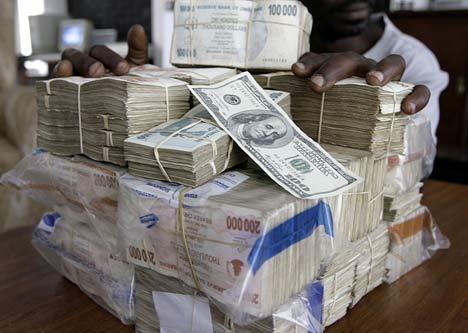THE year 1980 was a very good year indeed, not only for political reasons, but economic reasons as the Zimbabwe dollar was very strong against major currencies, even way stronger than regional currencies.
Fast forward 2008, the local currency had devalued to unacceptable levels and was less of a legal tender within and without Zimbabwean borders until the day it was demonetised as legal tender.
With its demise came loss of value to the populace from shares, life policies, money in bank accounts, savings, investments among others and there was confusion as to the valuation of Zimbabwean assets in general.
Then 2009 enter multi-currency regime after the population was no longer using the local currency to transact. Other currencies became official legal tender but US dollar being dominant due to it being a stable currency.
It is always ideal to have, as a country, our own currency to define our financial sovereignty and financial territorial integrity.
That is how things work and should be nothing political about it, it is economics at play.
Our own currency gives financial autonomy and allows monetary authorities to play a part in our economical initiatives through necessary monetary policy interventions.
Suffice to say most challenges are down to structural underlying fundamentals such that currency has nothing to do with it. It's the culture of the people that determines the value of the respective currency.
Due to economical challenges that ravaged the economy, we lost our Zimbabwe dollar to multi-currencies and with it came some relief and challenges at the same time.
Advantages of multi currency regime
- It brought in stability on prices relative to yester year era.
- Easily accepted across any transactional deals
- Returns from an external point of view are generous
- Encouraged investments into the country
- Ushered in business confidence and some form of revenues and some extent profitability
- Arrested Zimbabwe's number one enemy: inflation
Disadvantages of multi-currency regime
- It's a scarce resource
- Rural awareness cumbersome
- The central Bank cannot intervene with monetary instruments
- Hard currency shortages
It's an "illegal" maneuver given there is no permission from the respective central banks authorities to use their currencies as currency has ownership.
- Encouraged externalisations (both legal and otherwise) of currencies to the detriment of cash circulation in the country.
- Creates arbitrages between currencies, countries
- Exports are affected due to stronger currency use
- Economic vultures (with no economic value to local landscape) will circle for the kill as an easy source of hard currency
Disadvantages of Zimbabwe dollar
- Highly inflationary currency due to lack of production
- Lack of confidence and trust in the Zimbabwe dollar
- Unstable as a store of value
Advantages of Zimbabwe dollar
- Relative Exports competitiveness
- Reasonable cost structures
- Central bank interventions is possible and to a very large extent fully applicable.
- It's a morale booster and strikes ego, pride of its citizenry
When to bring back Zimbabwe dollar
Bond note by virtue of its utility is not Zimbabwean dollar but a monetary tool to alleviate financial challenges in the sector.
It has been used to try to aid exports earning power but it is not the silver bullet of the challenges experienced.
In addition it has the effect to arrest externalisations while increasing 'currency' circulation in the country.
Main areas that need to be attained before return of Zimbabwe dollar.
Some crucial fundamentals that need addressing before we can even entertain the thought of bringing our much needed own currency.
1. Sustainable foreign exchange reserves. One year import cover.
2. Sustainable Government budget which is the bed rock for a conducive environment
3. Demonstrable consumer and business confidence. This culminates into the much needed trust between stakeholders
4. Health of the job market which measures the employment ratio
5. Industry capacity utilisation of above 75 percent which has an indication on gross domestic product and productive vibrancy of the country
The buzz word is sustained business maneuvers or initiatives otherwise bringing back Zimbabwe dollar will be an exercise in futility as it will go the same way as the previous local currency and memories are still fresh for that to happen.
All the other issues like design, name of the local currency etc are just cosmetic and of no consequence to the grand scheme of things.
Above all a great business culture is fertile ground for the above.
These have been discussed on many forums so no need to repeat them on today's discussion.
In addition the Zimbabwean dollar can be brought in (after satisfying the above) to run concurrently with other multi-currencies. It's has worked in some countries.
For now let's increase our willingness to do things right in addressing the underlying fundamentals.
This is a Zimbabwean challenge and only Zimbabweans can make Zimbabwe great again.
No solution can come outside Zimbabwe.
It's now or never.
It's do or die. We need to change our business culture or perish.
It's a perceived accolade in that you are not judging yourself in the field.
IF YOU LIVE IN BYO PLEASE CONSERVE WATER
IF YOU LIVE IN ZIMBABWE PLEASE USE ELECTRICITY SPARINGLY: SOS (SWITCH OFF SWITCHES)
IF YOU LIVE ON PLANET EARTH PLEASE PRESERVE THE ENVIRONMENT
Morris Mpala is the managing director of MoB Capital Limited, a Bulawayo headquartered micro-finance institution with footprint across the country.
- chronicle
 Concern over Masvingo black market
Concern over Masvingo black market  Kenya declares three days of mourning for Mugabe
Kenya declares three days of mourning for Mugabe  UK's Boris Johnson quits over Brexit stretegy
UK's Boris Johnson quits over Brexit stretegy  SecZim licences VFEX
SecZim licences VFEX  Zimbabwe abandons debt relief initiative
Zimbabwe abandons debt relief initiative  European Investment Bank warms up to Zimbabwe
European Investment Bank warms up to Zimbabwe  Young Investment Professional (YIP) Graduate Programme 2019
Young Investment Professional (YIP) Graduate Programme 2019 











 Young Investment Professional (YIP) Graduate Programme 2019
Young Investment Professional (YIP) Graduate Programme 2019
Editor's Pick